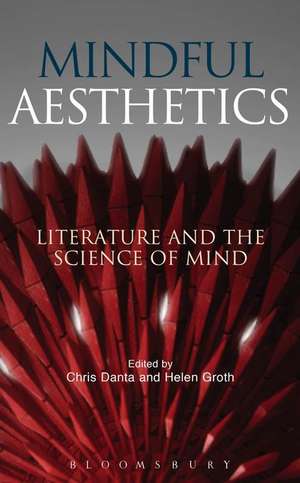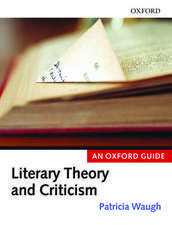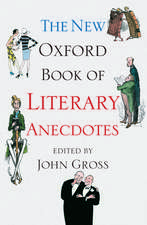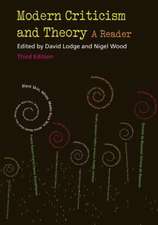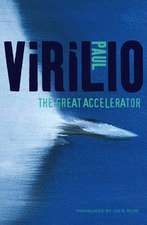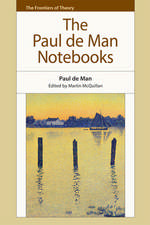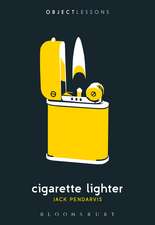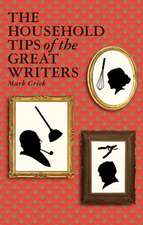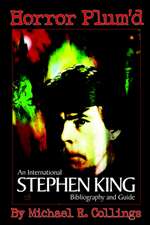Mindful Aesthetics: Literature and the Science of Mind
Editat de Dr. Chris Danta, Prof. Helen Grothen Limba Engleză Paperback – 20 mai 2015
| Toate formatele și edițiile | Preț | Express |
|---|---|---|
| Paperback (1) | 256.95 lei 6-8 săpt. | |
| Bloomsbury Publishing – 20 mai 2015 | 256.95 lei 6-8 săpt. | |
| Hardback (1) | 773.39 lei 6-8 săpt. | |
| Bloomsbury Publishing – 2014 | 773.39 lei 6-8 săpt. |
Preț: 256.95 lei
Preț vechi: 295.10 lei
-13% Nou
Puncte Express: 385
Preț estimativ în valută:
49.17€ • 51.46$ • 40.92£
49.17€ • 51.46$ • 40.92£
Carte tipărită la comandă
Livrare economică 31 martie-14 aprilie
Preluare comenzi: 021 569.72.76
Specificații
ISBN-13: 9781501308673
ISBN-10: 150130867X
Pagini: 248
Dimensiuni: 152 x 229 x 25 mm
Greutate: 0.34 kg
Editura: Bloomsbury Publishing
Colecția Bloomsbury Academic
Locul publicării:New York, United States
ISBN-10: 150130867X
Pagini: 248
Dimensiuni: 152 x 229 x 25 mm
Greutate: 0.34 kg
Editura: Bloomsbury Publishing
Colecția Bloomsbury Academic
Locul publicării:New York, United States
Caracteristici
Opens a critical dialogue between cognitive and non-cognitive models of mind in literary studies
Notă biografică
Chris Danta is Senior Lecturer in English in the School of the Arts and Media at the University of New South Wales, Australia. He is the author of Literature Suspends Death: Sacrifice and Storytelling in Kierkegaard, Kafka and Blanchot (2011) and the coeditor of Strong Opinions: J. M. Coetzee and the Authority of Contemporary Fiction (2011). He has also published essays in New Literary History, Angelaki, Textual Practice, Modernism/modernity, SubStance and Literature & Theology.Helen Groth is an Associate Professor and ARC Future Fellow in the School of the Arts and Media at the University of New South Wales, Australia. She is the author of Victorian Photography and Literary Nostalgia (2003), Moving Images: Nineteenth-Century Reading and Screen Practices (2013) and with Natalya Lusty, Dreams and Modernity: A Cultural History (2013).
Cuprins
Introduction: Between MindsChris Danta and Helen GrothSection One: TheoriaChapter 1. Psychology and Literature: Mindful Close ReadingBrian BoydChapter 2. Vitalism and Theoria Claire ColebrookChapter 3. Continental Drift: The Clash Between Literary Theory and Cognitive Literary Studies Paul SheehanChapter 4. Thinking with the World: Coetzee's Elizabeth Costello Anthony UhlmannSection Two: Minds in HistoryChapter 5. 'The brain is a book which reads itself': Cultured Brains and Reductive Materialism from Diderot to J. J. C. SmartCharles T. WolfeChapter 6. Muted Literary Minds: James Sully, George Eliot and Psychologised Aesthetics in the Nineteenth Century Penelope HoneChapter 7. The Mind as Palimpsest: Art, Dreaming and James Sully's Aesthetics of LatencyHelen GrothChapter 8. The Flame's Lover: The Modernist Mind of William Carlos WilliamsMark StevenSection Three: Contemporary Literary MindsChapter 9. 'The Creation of Space': Narrative Strategies, Group Agency, and Skill in Lloyd Jones's The Book of Fame John Sutton and Evelyn TribbleChapter 10. Reproductive Aesthetics Stephen MueckeChapter 11. Distended Moments in Neuronarrative: Character Consciousness and the Cognitive Sciences in Ian McEwan's Saturday Hannah CourtneyChapter 12. A Loose Democracy of the Skull: Characterology and NeuroscienceJulian MurphetAfterword Paul GilesIndex
Recenzii
[Danta and Groth's] collection, Mindful Aesthetics, goes out of its way to include all manner of competing views. There is an essay by the polemical evolutionary critic Brian Boyd who dismisses both psychoanalysis and behaviorism. There is a vigorous defense of theory by Claire Colebrook (and another by Paul Sheehan). There is also a critique by Anthony Uhlmann of the centrality of metaphor to understandings of embodied cognition. . The collection is quite lively.
More than fifty years have elapsed since CP Snow delivered his famous lecture on 'The Two Cultures' in 1959, which identified an increasing gulf between scientific and literary disciplines. ... This collection of essays ... reflects on the impact of cognitive science on literature. ... The collection's most successful historicizing essays are not framed as critiques of science from a humanities perspective, but transcend stark disciplinary divisions by drawing out mutual intersections. ... This emphasis on the openness and plasticity of cerebral functioning gestures towards the ways in which corporeal matter is permeated and shaped by theoretical abstractions. Contemporary Western society might be carved into neat opposing camps but biology exists in history: nature is entangled with culture whether we like it or not.
The three groups of essays published in this volume provide an abundance of arguments legitimizing the use of literary research, thus placing it at the center of the entire field of cognitive literary studies. ... One of the great merits of this collection is the way in which it produces conversations around such differences of opinion, which results in the ability to read a number of the contributions dialogically. ... [It] avoids the temptation to find immediate solutions for the somewhat problematic position of literary studies within the sciences. Rather, it articulates nuanced questions concerning the nature of literary research and its relation to the scientific method. The absence of an overarching conclusion suggests that the editors wished to emphasize the diversity of perspectives expressed in their collection. This distinctive feature testifies to the scholarly quality of this volume.
[No] fewer than three important essay collections came out during the same period [2013], beginning with . Cognitive Literary Studies. . Two more specialized, but still wide-ranging, collections appeared later in the year: Mark Bruhn and Donald Wehrs's Cognition, Literature, and History, the first book of essays devoted to cognitive historicism, and Chris Danta and Helen Groth's Mindful Aesthetics, featuring an extended dialogue among cognitive researchers and critical observers of the field. Taken together, the lists of contributors to these three collections (which show surprisingly little overlap) demonstrate the broad appeal of cognitive literary studies, featuring scholars stationed not only in departments of English and American literature, but also in Spanish, French, German, theater, women's studies, comparative literature, media and film studies, and philosophy departments as well.
Do recent advances in neuroscience better help us understand culture? Few questions have been more divisive for contemporary criticism and theory in the humanities. This timely collection of essays by critics on both sides of the debate helps us get to grips with the issue. Indeed I suspect that, from within its pages, a resolution begins to appear. What resolution? Read the book and find out.
If one is determined to center one's literary attention on the mind in the text, this volume is for you. And while committed in the main to cognitivist forms of literary criticism and theory, Mindful Aesthetics ranges over arguments both for and against this particular mode of literature and science scholarship. It makes a solid scholarly contribution to the ongoing debates.
Featuring an exciting mix of established and emergent scholars in fields that include philosophy, literary theory, film studies, and the history of science, this wide-ranging collection raises key questions for research situated at the interface of aesthetics and the cognitive sciences. Indeed, even as it charts new directions for the study of literary (and other) art vis-à-vis human beings' mental dispositions and capacities, Mindful Aesthetics stands as a model for cross-disciplinary scholarship more generally.
Mindful Aesthetics stages an informed and effective intervention into studies of literature, cognition, and evolutionary theory. In its energy, originality, and breadth of critical interests, this wide ranging collection speaks to the vitality and promise of the emerging field of cognitive literary and cultural criticism.
More than fifty years have elapsed since CP Snow delivered his famous lecture on 'The Two Cultures' in 1959, which identified an increasing gulf between scientific and literary disciplines. ... This collection of essays ... reflects on the impact of cognitive science on literature. ... The collection's most successful historicizing essays are not framed as critiques of science from a humanities perspective, but transcend stark disciplinary divisions by drawing out mutual intersections. ... This emphasis on the openness and plasticity of cerebral functioning gestures towards the ways in which corporeal matter is permeated and shaped by theoretical abstractions. Contemporary Western society might be carved into neat opposing camps but biology exists in history: nature is entangled with culture whether we like it or not.
The three groups of essays published in this volume provide an abundance of arguments legitimizing the use of literary research, thus placing it at the center of the entire field of cognitive literary studies. ... One of the great merits of this collection is the way in which it produces conversations around such differences of opinion, which results in the ability to read a number of the contributions dialogically. ... [It] avoids the temptation to find immediate solutions for the somewhat problematic position of literary studies within the sciences. Rather, it articulates nuanced questions concerning the nature of literary research and its relation to the scientific method. The absence of an overarching conclusion suggests that the editors wished to emphasize the diversity of perspectives expressed in their collection. This distinctive feature testifies to the scholarly quality of this volume.
[No] fewer than three important essay collections came out during the same period [2013], beginning with . Cognitive Literary Studies. . Two more specialized, but still wide-ranging, collections appeared later in the year: Mark Bruhn and Donald Wehrs's Cognition, Literature, and History, the first book of essays devoted to cognitive historicism, and Chris Danta and Helen Groth's Mindful Aesthetics, featuring an extended dialogue among cognitive researchers and critical observers of the field. Taken together, the lists of contributors to these three collections (which show surprisingly little overlap) demonstrate the broad appeal of cognitive literary studies, featuring scholars stationed not only in departments of English and American literature, but also in Spanish, French, German, theater, women's studies, comparative literature, media and film studies, and philosophy departments as well.
Do recent advances in neuroscience better help us understand culture? Few questions have been more divisive for contemporary criticism and theory in the humanities. This timely collection of essays by critics on both sides of the debate helps us get to grips with the issue. Indeed I suspect that, from within its pages, a resolution begins to appear. What resolution? Read the book and find out.
If one is determined to center one's literary attention on the mind in the text, this volume is for you. And while committed in the main to cognitivist forms of literary criticism and theory, Mindful Aesthetics ranges over arguments both for and against this particular mode of literature and science scholarship. It makes a solid scholarly contribution to the ongoing debates.
Featuring an exciting mix of established and emergent scholars in fields that include philosophy, literary theory, film studies, and the history of science, this wide-ranging collection raises key questions for research situated at the interface of aesthetics and the cognitive sciences. Indeed, even as it charts new directions for the study of literary (and other) art vis-à-vis human beings' mental dispositions and capacities, Mindful Aesthetics stands as a model for cross-disciplinary scholarship more generally.
Mindful Aesthetics stages an informed and effective intervention into studies of literature, cognition, and evolutionary theory. In its energy, originality, and breadth of critical interests, this wide ranging collection speaks to the vitality and promise of the emerging field of cognitive literary and cultural criticism.
